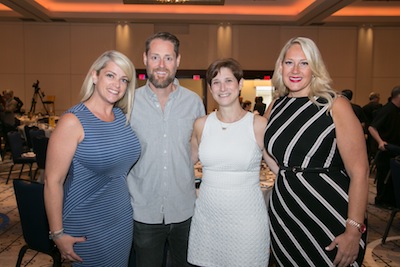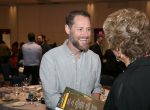Hootsuite’s Ryan Holmes speaks to an attendee at the Innovators Lunch on May 4. (photo by Sandra Steier)
More than 550 people at the Jewish Family Service Agency’s Innovators Lunch on May 4 raised more than $266,000 for the important services JFSA provides.
Starting the event at the Hyatt Regency, featuring Hoosuite founder and chief executive officer Ryan Holmes, was Beth Israel Rabbi Jonathan Infeld who, before the motzi, said a few words about volunteer Elayne Shapray, whose funeral had been that morning. Incoming JFSA board chair Karen James also spoke about Shapray’s contributions, noting that she had been “honored with the highest volunteer award from JFSA, the Paula Lenga Award, for her quiet strength and years of support.”

When event chair Dr. Sherri Wise took to the podium, she thanked everyone involved in making the lunch possible, including her co-chairs, Shannon Ezekiel and Hillary Cooper. Richard Fruchter, senior management consultant at JFSA, added his thanks and, after a video about JFSA’s impact, introduced Dr. Neil Pollock who, with his wife Michelle, matched all new and increased donations to the lunch up to $20,000.
Pollock spoke about his family’s involvement with JFSA. In particular, he spoke about Dorita Flasker, who came to Vancouver from South America as a senior, having had all her wealth expropriated by her home country’s government. In the years since JFSA connected them, she and the Pollocks have become family, and they all recently celebrated her 80th birthday together.
Shay Keil of Keil Investment Group of ScotiaMcLeod, one of the lunch’s co-presenting sponsors, introduced the keynote speaker. Holmes founded Hootsuite in 2008, said Keil, taking the company from a small startup “to a global leader in social media with over 13 million users, including 800 of the Fortune 1000 companies.”
“My parents were both teachers – they left teaching in the ’70s to get back to the land, to become farmers,” said Holmes. “They bought a hobby farm. I grew up with goats, chickens … kerosene lamps, a water well in the Okanagan Valley.”
He discovered computers – “magical things” – at the library. The librarian noticed his enthusiasm and suggested he enter a schoolwide programming contest. Two months later, he won the contest – the prize, an Apple IIc computer, which had to be connected to the family car’s battery, as their home had no electricity.
His first business was a paintball company he started in high school. He went to university to study business, but dropped out and opened a pizza place, which he ran for a couple of years. After selling the restaurant, he moved to Vancouver, bought a computer and started learning how to build HTML websites. He got a job at a dot-com that crashed about six months later, so founded his own agency, Invoke. He continued to learn his craft and eventually hired employees. They had customers to whom they would provide computing services and they built a number of products, such as product-management and e-commerce systems.
“Around 2008, we started to do marketing on social media for our customers,” he said. “What we realized very quickly was that there weren’t very many tools out there to manage social media…. We needed a tool to help manage multiple team members and multiple social networks all from one place, and that was the aha moment for Hootsuite.”
Soon thereafter, Hootsuite was launched. Investors were found about a year later – “Remember, this was at a point when people were asking, ‘Is Twitter just a fad?’ ‘Is Facebook just the next MySpace or the next Friendster, is it going to be obsolete in a year?’ People didn’t know if social media was relevant and was here to stay.”
Hootsuite – which has about 800 employees – is headquartered in Vancouver, but has offices around the world. “We send 28 million messages a week and these messages reach three billion users across the planet every week.” Among those users have been the Arab Spring and Occupy Wall Street movements, and the White House.
“We’re in an era of unimagined disruption,” he said, pointing to three trends driving it: social (sharing videos, for example, which can go viral), a more collaborative economy (businesses like Uber) and mobile.
“Sixty percent of people who complain on Twitter expect a response within one hour,” said Holmes. “So, if you’re a brand, if you’re a business, and you’re not there … it’s like you don’t have a website, like you don’t have a telephone…. The thing about social is there is an implied contract: you’re naked and transparent….” If customers do not get a response, “they’re going to talk about it over and over again and, so, you’re going to be brought into the open as a business.”
Holmes compared various communications technologies. “The telephone took 75 years to reach 50 million users, radio 38, television 13, LinkedIn six-and-a-half, Twitter four, Facebook three, Instagram 1.7. Adoption is happening quicker and quicker.”
He then talked a bit about Snapchat, and showed the audience how to use it.
About the next big thing, he hopes that, like “the PayPal mafia” – “a group of alum … [who are] driving a lot of the innovation that’s happening in Silicon Valley” – there will be a “maple syrup mafia.”
“I would love to see the alum of Hootsuite go on to create the next 10 Hootsuites within Vancouver and more within Canada,” he said.
Already, the B.C. technology sector employs more people than the mining, oil and gas, and forestry sectors combined. To create an even better ecosystem for innovation, he said, there are three key requirements: capital (money to build companies), environment (places for people to live and work) and talent (education and immigration, as there currently is a lack of supply).
“There is huge opportunity for people who want to head into this industry,” he said, predicting an increasing demand for these types of jobs.
During the question-and-answer period, Holmes responded to concerns about privacy – he believes the good aspects of technology outweigh the bad; housing – a problem for every business, he said, putting the onus on the government to increase supply, create more diverse product (not just 500-square-foot living spaces) and implement policies to control demand; and corporate responsibility, which he thinks will become more of an issue. To him, the lack of what once were basic skills – such as writing – is simply the evolution of language, the next steps being the keyboard and more voice-activated technology.

